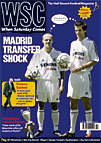 There were more than one team of football winners in Athens, though there waas some squabbling over what Iraq's achievement means, reports Matthew Brown
There were more than one team of football winners in Athens, though there waas some squabbling over what Iraq's achievement means, reports Matthew Brown
For a nation that supposedly fell in love with the game this summer, Greece seemed strangely indifferent to the Olympic football tournament. Perhaps they simply needed a break after all that Euro 2004 euphoria, but many matches at the Olympic Games were played out in front of virtually empty stadiums. In general the crowds rose above 20,000 only when Greece were playing or if the game was held in Athens itself. In some cases, the attendances barely rose above 5,000 and in others were fewer than 1,500.
Even the men’s final – surely the only football match this side of Hackney Marshes to begin at ten o’clock in the morning – attracted barely enough fans to half fill the 72,000-capacity venue, while 10,416 watched the United States beat Brazil to win the women’s event.
Often, the Olympic football tournament has been a platform from which emerging football nations announce their arrival on the world stage – Puskas’s Hungary side won the gold at Helsinki in 1952 before they played in a World Cup, for example. And remember Nigeria – Kanu, Okocha and all – winning in 1996, or the lions of Cameroon beating Portugal in 2000? In which case, the country we should all be watching out for in the future is, errm… Argentina.
Their team, including Manchester United’s Gabriel Heinze and Valencia’s Roberto Ayala, won the final, but made heavy weather of beating Paraguay by a single goal, despite their South American neighbours having two men sent off in the second half.
Argentina may have taken the medals, but the real team of the tournament were Iraq. With a side including players once tortured and imprisoned by Saddam Hussein’s son Uday, Iraq surprised everyone by finishing fourth, losing by a single goal to Italy in the bronze medal match, having gone down 3-1 to Paraguay in the semi-finals. From the moment of their 4-2 victory over Portugal (Cristiano Ronaldo and all) in their opening game, the Iraqis became one of the Olympic “fairy-tale” stories. They even made it into the pages of Sports Illustrated. Inevitably, the huge-circulation American sports magazine drooled over Iraq’s unexpected exploits as if they were a symbol of something far more significant than goals and medals. “Frustrated by their nation’s instability, the Iraqis played in Greece as though they’d been liberated,” it said. Apparently their 4,000 fans (Greece has a significant Iraqi community) rushed the field after each goal in their 2-0 win over Costa Rica, “unleashing a warlike whoop that had nothing to do with any war”.
That’s not quite how the team saw it, especially when President Bush tried to hitch an election message onto the Iraqis’ achievements. When a Bush commercial displayed the flags of Iraq and Afghanistan, with a voiceover saying: “At this Olympics there will be two more free nations – and two fewer terrorist regimes,” the Iraq players reacted furiously. “Iraq as a team does not want Mr Bush to use us for the presidential campaign,” midfielder Salih Sadir was reported to have said. “He can find another way to advertise himself.” “How will Bush meet his god having slaughtered so many men and women? He has committed so many crimes,” said another.
The story of how the team had qualified for the Games despite playing their home matches in Jordan, causing national fervour back in May, made the media rounds in Athens and became a convenient symbol of the nation’s transformation in the face of so much turmoil. “No team in these Games has travelled a more difficult road than Iraq’s soccer squad,” said SI. But the Iraq coach Adnan Hamad Majeed dismissed suggestions that his team’s run in the tournament was a sign of peace. “You cannot talk about a peace symbolism, since there is still war in Iraq and military everywhere in the country,” he said. And when asked whether his side’s sporting achievements should be seen in a non-political way, he responded: “Unfortunately, the present situation cannot allow such a separation. Our people are suffering and that’s why we want to offer them some solace.”
He added, somewhat improbably: “Everybody in Iraq is happy now,” although you know what he means. “Our achievements can make them forget a little about their problems. That’s why we are twice happy, for our success as well as making fellow countrymen proud.”
Unfortunately, they finished fourth, failing to win the medal that would have completed the fairy tale. And as for those club managers back home who think Olympic football is all a bit Mickey Mouse, well that’s certainly not what the Argentina players felt. Heinze and his team-mates celebrated their triumph by holding hands in a big circle in the centre of the pitch, dancing round and round in a jig of joy.
Meanwhile, on the morning of the final, Raad Abbas Rasheed, Iraq’s taekwondo competitor, was crushed 12-0 by an American. Now there’s symbolism for you.
From WSC 212 October 2004. What was happening this month